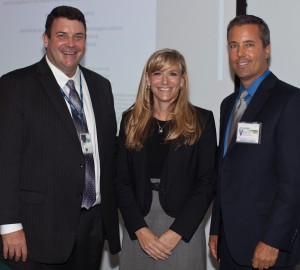Mentors Program-Northrop Grumman and Juno Technologies

Mentors and protégés gain from DoD program
Northrop Grumman signs agreement with Juno TechnologiesBy Manny Lopez
Since 1991, the U.S. Department of Defense (DoD) has helped small disadvantaged and women-owned companies get to the DoD contracting table through the Mentor-Protégé Program (MPP).
Enacted under the direction of former Sen. Sam Nunn and former Secretary of Defense William Perry, the MPP provides incentives for DoD prime contractors to provide mentoring for small business protégés through tailored developmental assistance plans. The program’s intention is to leverage a mentor’s technical and business expertise, thus enhancing the protégés skills and ability to compete in the larger arena as subcontractors, suppliers and ultimately, DoD prime contractors.
On Aug. 6, defense contracting giant Northrop Grumman finalized the signing of a two-year mentor-protégé agreement with woman-owned Juno Technologies Inc. of San Diego — a subcontractor on the U.S. Navy’s Consolidated Afloat Networks and Enterprise Services (CANES) program.
The CANES program is supposed to achieve technology heterogeneity across much of the Navy’s fleet of 280 ships and submarines, including Maritime Operations Centers by 2021.
The Navy awarded a $37 million contract earlier this year to Northrop Grumman for the initial design of CANES, which could grow to $638 million if the service exercises all contract options.
According to Dr. Lee Whitt, technical fellow for Northrop Grumman, under the agreement approved by the Defense Contract Management Agency —which oversees contract administration for the DoD and other federal agencies — Northrop Grumman will help Juno Technologies improve its public image to potential customers, develop new business opportunities, gain exposure at trade shows, understand foreign military sales and International Traffic in Arms Regulations.
“The Mentor-Protégé Program gives us a chance to work with Juno Technologies beyond the confines of a particular contract, and help them become a better success by providing training and guidance in addition to developing areas of expertise they may be lacking in,” Whitt said. “Instead of saying we want you as a subcontractor to perform better on this project for our customer, we turn that around and say that we as a larger company with deep resources, want to help you become a better company.”
As a requirement on contracts it wins from the Pentagon, Northrop Grumman — a $34 billion company based in Falls Church, Va., with information technology and unmanned aircraft divisions in San Diego — must team up with a certain percentage of small disadvantaged businesses as subcontractors. For its participation, Northrop Grumman will receive credits towards its required subcontracting percentage goal based on the cost of developmental assistance.
Whitt explained that the decision to enter into the agreement was based on Juno Technologies having shown itself to be an extraordinary small business that has performed exceptionally well in all areas as a subcontractor over the course of the two companies’ five-year working relationship.
Founded in Oct. 2001 by Julie and Dan Ferraro, Juno Technologies Inc. has grown to 37 employees working on national and international projects.
Juno’s focus is on IT engineering, systems integration, software development, and technical assistance and support for the Space and Naval Warfare Systems Command (SPAWAR).
“We’re firm believers in that if you do the right thing, good things will come your way,” Co-owner and Vice President Dan Ferraro said. “It’s not easy for a small business to find a company that would be willing to invest the kind of resources, effort and time that Northrop Grumman has in us.”
With shrinking budgets and limited opportunities for small companies in the defense industry, Ferraro pointed out that having a big brother take them under their wing gives Juno Technologies the strength to speed up its business plan, along with the optimism that it can actually make the jump to the next level.
Ferraro called the opportunity “dramatic” in that it allows Juno to go after bids and proposals that it was not able to qualify for previously. With Northrop Grumman’s assistance, Ferraro expects that Juno Technologies can win a bigger share of the defense contracting pie, which translates into more jobs and better career paths for San Diegans.
“If you can, I think it’s invaluable to get involved in a mentor-protégé program such as this one,” Ferraro said. “There isn’t much help out there, We now have a big brother to answer questions and help us to do things properly.”


